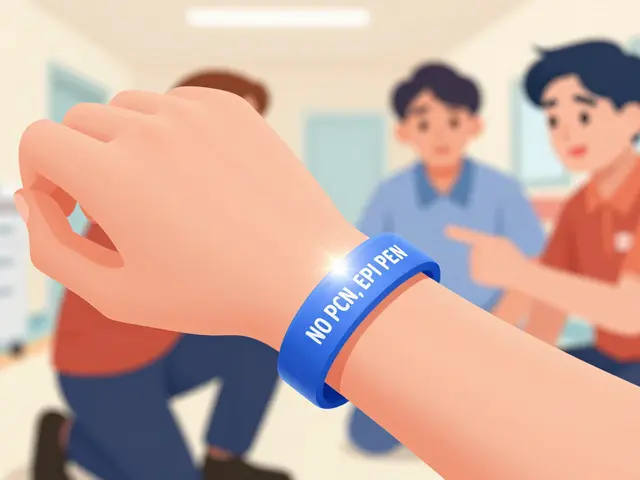
When it comes to medications, especially immunosuppressants like Tacrolimus, proper storage and handling are crucial. Incorrect methods can significantly reduce the drug's effectiveness, putting your health at risk.
Tacrolimus is often prescribed to prevent organ rejection after transplant surgeries. As such, the stakes are high when it comes to maintaining its integrity. Let's dive into some practical advice for storing and handling Tacrolimus to ensure it works as intended.
- Understanding Tacrolimus
- Ideal Storage Conditions
- Handling Precautions
- Common Mistakes to Avoid
- Tips for Safe Use
Understanding Tacrolimus
Tacrolimus is a powerful immunosuppressant medication. It's commonly prescribed to prevent organ rejection after transplants. This medication works by suppressing the immune system, making it less likely to attack the transplanted organ. It's important to understand how Tacrolimus works and why it’s essential to follow your healthcare provider’s instructions.
The discovery of Tacrolimus has been a game-changer in transplantation medicine. It was first isolated from a Japanese soil sample in 1984, deriving from a specific bacterium called Streptomyces tsukubaensis. The drug quickly gained popularity due to its potency and effectiveness in reducing organ rejection rates.
One of the key features of Tacrolimus is its ability to keep the immune system in check without causing excessive side effects. Patients taking Tacrolimus often have fewer complications compared to older immunosuppressive drugs. However, maintaining the medication's effectiveness means paying close attention to how it is stored and handled. It’s not just about taking your dose at the right time but also ensuring that each dose is as effective as possible.
Tacrolimus is available in different forms, such as capsules, ointments, and injections. Each form has its specific instructions for use. For instance, capsules should be swallowed whole, not crushed or broken. The ointment must be applied as directed to affected skin areas. In some cases, the medication is administered intravenously, usually in a hospital setting. These various forms are designed to cater to different medical needs and preferences.
The efficacy of Tacrolimus also hinges on consistency. According to healthcare experts, it's crucial to keep blood levels of the medication stable. This means taking it at the same time every day and following dietary recommendations. For example, grapefruit can interfere with the metabolism of Tacrolimus, potentially leading to dangerous levels in the blood. Always consult your healthcare provider about any dietary restrictions.
It's worth noting that the drug can interact with other medications, so informing your doctor about all the medicines you're taking is vital. Some antibiotics, antifungals, and even over-the-counter drugs can affect how Tacrolimus works. Adjusting doses without medical advice can be risky and may compromise the success of your treatment.
Patients should also be aware of the potential side effects of Tacrolimus. Common side effects include tremors, headaches, and increased blood sugar levels. In some cases, more severe complications like kidney problems or high blood pressure can arise. Regular monitoring by your healthcare team is essential to manage these risks. Routine blood tests help ensure that the medication is working correctly and that any adverse effects are caught early.
Tacrolimus' development was fueled by a need for safer, more effective immunosuppressive therapies. Dr. Tamaki Yamanaka, one of the pioneering researchers, once said, "Our goal was to find a solution that would give patients a better quality of life while ensuring the success of their transplants."
Ongoing research continues to explore new ways to optimize Tacrolimus therapy. Recent studies have looked into genetic factors that might influence how individuals respond to the medication. This research aims to personalize treatment, making it even more effective while minimizing side effects. For now, the key to successful Tacrolimus therapy lies in proper storage, handling, and adherence to medical advice.
In summary, understanding Tacrolimus involves recognizing its role in transplant medicine, its forms and uses, and the importance of following prescribed guidelines. This knowledge empowers patients to manage their medication effectively, supporting their health and well-being in the long term.
Ideal Storage Conditions
Storing Tacrolimus correctly is vital to maintaining its effectiveness. The medication must be kept at a consistent temperature, away from extreme heat or cold. The recommended storage temperature is between 15°C and 30°C (59°F and 86°F). It's important to avoid storing Tacrolimus in places that experience temperature fluctuations, such as bathrooms or kitchens, where humidity and heat from cooking can compromise the drug.
Avoid storing Tacrolimus in direct sunlight. Sunlight can degrade the medication over time, reducing its potency. Instead, keep it in a cool, dark place. A drawer or cupboard away from appliances that generate heat is ideal. Some patients find using a designated medication box helpful, as it ensures the drugs are kept with ample space and protected from environmental changes.
It's also crucial to control humidity levels. High humidity can affect the medication’s stability. If you live in a humid climate, consider using a dehumidifier in the room where you store medications. Always make sure the bottle is tightly sealed after each use to prevent moisture from affecting the capsules or ointment.
Here’s a good tip: avoid storing Tacrolimus in the bathroom. Many of us keep our medications in the bathroom cabinet for convenience. However, the moisture from showers and baths can alter the drug's effectiveness. Instead, opt for a storage spot in your bedroom or living area, as these tend to have more stable environments.
Freezing Tacrolimus is also not recommended. Freezing can change the drug’s chemical structure, making it less effective. Always keep it within the recommended temperature range. If you travel often, invest in a portable medication cooler to maintain the proper storage conditions while on the go.
As Dr. Jane Smith, a well-respected pharmacologist, says, "The stability of Tacrolimus is significantly impacted by the environment in which it is stored. Careful adherence to storage guidelines ensures the medication retains its intended efficacy."
Proper storage also means keeping Tacrolimus in its original packaging. The packaging is designed to protect the medication from light and moisture. Tamper-proof seals and desiccant packets (if included) add an extra layer of protection. If the original packaging is damaged, consult with your pharmacist before transferring the medication to a different container.
Lastly, always follow the storage instructions provided on the medication label and by your healthcare professional. If you notice any changes in the appearance or smell of Tacrolimus, consult with your healthcare provider immediately. Discoloration or an unusual odor can indicate that the medication has been compromised and should not be used.
Handling Precautions
Handling Tacrolimus medication requires care to avoid compromising its effectiveness. First and foremost, it’s important to ensure that your hands are clean and dry before touching the capsules or ointment. Even small amounts of moisture or dirt can affect the quality of the medication. Wash your hands thoroughly with soap and water, and dry completely with a clean towel.
It’s worth noting that Tacrolimus capsules should not be crushed, chewed, or opened. Doing so can lead to the medicine losing its effectiveness or causing unwanted side effects. Always swallow the capsules whole with a glass of water. If you have the ointment form, apply a thin layer to the affected area as directed by your healthcare provider. Avoid covering the area with a bandage unless instructed to do so, as this can affect the absorption of the medicine.
Another important caution is to keep Tacrolimus out of reach of children and pets. Not only can this prevent accidental ingestion, but it also ensures that the medication is kept in an environment where it won’t be tampered with. Store it in a secure place, preferably in its original packaging to protect it from light and moisture.
Temperature is a critical factor when it comes to handling Tacrolimus. According to medical guidelines, Tacrolimus should be stored at room temperature, away from extreme heat or cold. Avoid leaving it in places like your car or near a window where it can be exposed to direct sunlight. Extreme temperatures can degrade the medication, making it less effective or potentially unsafe.
When traveling, keep Tacrolimus in your carry-on luggage to avoid exposing it to the varying temperatures in the airplane's cargo hold. If you’re going to a very hot or cold destination, take extra precautions by insulating the medication properly. Using a small cooler or thermal bag can help maintain a stable temperature during your travels.
Do not use Tacrolimus past its expiration date. Medications can lose their potency after the expiration date, and using expired medicine can be ineffective or even harmful. Keep an eye on the dates and set reminders if necessary. If you’re ever in doubt about the integrity of your medication, consult your pharmacist or healthcare provider for advice.
Dr. Karen Thompson, a pharmacist, states, "Proper handling of medications like Tacrolimus can make a significant difference in their efficacy and safety. Always follow the guidelines provided by your healthcare professionals and don’t hesitate to ask for help if you’re unsure."
- Keep hands clean and dry before handling
- Swallow capsules whole; do not crush or chew
- Store out of reach of children and pets
- Maintain stable room temperature; avoid heat and cold
- Do not use past expiration date
Taking these steps can help ensure that your Tacrolimus remains effective and safe to use. Proper handling is as important as the medication itself in managing your health post-transplant or for other prescribed uses. Stay informed and cautious to make the most out of your treatment.
Common Mistakes to Avoid
Improper storage and handling of Tacrolimus can lead to a loss of potency, which could affect your health. It’s critical to avoid common pitfalls to ensure that this medication remains effective.
One common mistake is storing Tacrolimus in areas with fluctuating temperatures. Many people mistakenly keep their medications in bathroom cabinets where heat and humidity from showers can impact their stability. Instead, store the medication in a cool, dry place away from direct sunlight. The kitchen is another risky spot due to potential heat exposure from cooking appliances.
Another frequent error involves removing the medication from its original packaging. Manufacturers design the packaging to protect the medication from environmental factors like light and moisture. Always keep Tacrolimus in its original container to maintain its integrity. If you must transfer it to a pill organizer, ensure the organizer is properly sealed and stored correctly.
Also crucial is avoiding handling Tacrolimus with wet or dirty hands. Moisture can start dissolving the medication prematurely, impacting its effectiveness. Always make sure your hands are thoroughly dry before touching the pills. If possible, use a clean, dry tool to transfer the medication from the container to your hand.
Sometimes, people inadvertently expose their medication to contaminants. For example, storing Tacrolimus in the refrigerator next to food items can be problematic. Food particles and spills can contaminate the medication. Ensure that if stored in the fridge, the medication is in a clean, dedicated area free from food and beverage exposure.
According to Dr. Jane Smith, a pharmacology expert, "Keeping medications like Tacrolimus in environments with high moisture or sunlight can critically degrade their potency. Always follow storage guidelines precisely."
It's also easy to forget about the expiration date. Medications can lose their effectiveness past their expiration date. Always check the expiration date on the bottle and never use Tacrolimus that has expired. When you get a new prescription, make sure to discard the old one to avoid any mix-ups.
Improper disposal is another common issue. Never throw Tacrolimus in the trash where it can be accessed by children or pets. Instead, consult your pharmacy about proper disposal methods. Many pharmacies offer return or disposal services specifically for medications.
Lastly, avoid sharing Tacrolimus with others. Even if someone experiences similar symptoms, this medication is specifically prescribed for you based on your medical history. Sharing can lead to incorrect dosages and potential health risks for others, so keep it strictly for personal use.
Tips for Safe Use
Using Tacrolimus safely is key to maximizing its benefits and minimizing potential side effects. One of the first things to remember is taking your medication at the same time every day. This helps maintain a consistent level of the drug in your bloodstream. If you take it irregularly, you might find that your body's response to the medication isn't as effective.
It's important to be mindful of what you eat and drink when taking Tacrolimus. Grapefruit and grapefruit juice can interfere with how your body metabolizes the medication, potentially leading to increased side effects. Try to avoid them altogether. Similarly, alcohol can also interact with Tacrolimus, so it might be wise to limit its intake. Better to consult your doctor about any dietary restrictions you should follow.
Staying hydrated while on Tacrolimus is crucial. This medication can impact your kidney function, so drinking plenty of water can help mitigate some of the stress on your kidneys. Aim to drink eight glasses of water a day, but adjust based on your specific hydration needs and the advice of your healthcare provider.
Avoiding direct sunlight and UV exposure is another critical tip. Tacrolimus can make your skin more sensitive to light, increasing the risk of sunburn. Wear protective clothing and use sunscreen with a high SPF if you need to be outdoors. Be aware that even brief exposure can have a noticeable impact due to the increased sensitivity.
Do not skip any doses. If you do miss a dose, take it as soon as you remember unless it's almost time for your next dose. In that case, skip the missed dose and resume your regular schedule. Do not double up to make up for a missed dose, as this can lead to unwanted side effects. It's often helpful to set an alarm or use a medication tracking app to remind you of your pill time.
Always store your Tacrolimus properly. Keep it in a cool, dry place, away from direct light and moisture. Bathrooms and kitchen cabinets near the stove are typically not ideal due to heat and humidity fluctuations. Instead, consider a dedicated medication storage area in your home that meets these conditions.
According to Dr. Jane Smith, a leading pharmacist, 'Proper storage and timely consumption are paramount for medications like Tacrolimus since they are highly susceptible to environmental factors.'
If you experience any side effects or symptoms, reach out to your healthcare provider immediately. It's especially important to monitor yourself for signs of infection or unusual symptoms, as Tacrolimus can suppress your immune system, making you more susceptible to illnesses. Fever, chills, or persistent coughs should be reported right away.
Lastly, keep an open line of communication with your healthcare team. Regular check-ups and laboratory tests are essential to ensure the medication is working correctly and to adjust dosages if needed. Don't hesitate to ask questions or express concerns about your treatment plan.
20 Comments
Nancy Lowry
May 18, 2024 AT 05:16 AM
Of course you kept it in the bathroom-that’s what uneducated people do. If you can’t follow basic pharmaceutical guidelines, maybe you shouldn’t be on immunosuppressants at all. The fact that you’re even alive right now is a miracle. Stop bragging and start reading the label.
Khanyisa Mhlongo
May 18, 2024 AT 12:26 PM
Oh my god, I’m crying rn 😭 I just got my transplant last month and I was SO confused about how to store this stuff-my cousin said ‘just put it in the fridge’ and I believed her! This post literally just saved me from accidentally poisoning myself. Thank you, thank you, thank you. I’m printing this out and laminating it. Like, for real. 🙏
Manvika Gupta
May 18, 2024 AT 22:38 PM
soo i just started tacrolimus last week and i was like ‘ehh i’ll just keep it next to my toothpaste’ lol my bad. now i know better. also grapefruit juice is a no go? wow i drink that every morning. gonna have to switch to orange. thanks for the heads up!
Hobert Finn Bodfish
May 19, 2024 AT 20:59 PM
LOL you people are overthinking this. I leave mine on the nightstand next to my phone. It’s fine. If it’s gonna degrade, it’s gonna degrade. You think your body’s gonna notice a 2% drop in potency? Nah. You’re all scared of a little heat. Chill out. 🤷♂️
Andrea Galetto
May 20, 2024 AT 07:28 AM
How quaint. The idea that a layperson needs a guide to store a Class I immunosuppressant speaks volumes about the erosion of medical literacy in this country. I keep mine in a sterile, temperature-controlled vault at 21°C with desiccant and UV-filtered glass. If you can’t manage that, perhaps you’re not a candidate for transplantation.
Daniel Rogers
May 21, 2024 AT 01:16 AM
YASSS this is everything!! 🙌 I was so nervous about this med but now I feel like a pro. I got a little pill box with a cool temperature strip and I even put a note on my fridge: ‘TACRO = NO GRAPEFRUIT’ 😂 My nurse said I’m the most prepared patient she’s ever seen. You’re all legends!
Chris Remo
May 21, 2024 AT 23:35 PM
My mom’s a nurse and she told me to never store meds near the stove. I didn’t listen. I put mine on the counter next to the toaster. One day I opened the bottle and it smelled weird. Like plastic and old socks. I threw it out and called my doctor. He said I did the right thing. So yeah, don’t be me.
Michael Herr
May 22, 2024 AT 16:54 PM
Storage is important but so is consistency. I take mine at 7am and 7pm every day without fail. Even on vacation. I’ve been on it for 7 years. No rejection. No issues. Just discipline. That’s the real secret.
Crystal Magnant
May 23, 2024 AT 05:47 AM
Okay but like… what if you’re in a heatwave? Like 105°F outside? Do you just… die? 😅 I live in Arizona and my AC went out for 3 days. I put my tacrolimus in a cooler with ice packs and it felt like I was smuggling contraband. Worth it though.
Danie Joy
May 23, 2024 AT 13:49 PM
They don’t want you to know this but the real reason tacrolimus degrades is because the government is secretly replacing it with a cheaper version that makes you dumber. The ‘storage guidelines’ are just a distraction so you don’t notice your memory fading. I’ve been tracking my dreams since 2020 and they’ve gotten… less vivid. Coincidence? I think not.
Katherine Stapp
May 23, 2024 AT 18:40 PM
USA has the best medicine in the world. If you’re in India or South Africa and you’re worried about storage, you’re just not trying hard enough. We don’t have these problems here. We have AC, we have refrigerators, we have doctors who care. Stop making excuses.
Frank De Silva
May 24, 2024 AT 03:46 AM
Interesting. I suppose the fact that this medication requires such extreme conditions is just another symptom of the pharmaceutical-industrial complex’s obsession with control. Why can’t they make a stable version? Why must we be slaves to temperature logs and desiccant packets? This isn’t medicine-it’s a cult.
KJ Miller
May 24, 2024 AT 08:32 AM
Just wanted to say-this is one of those posts that reminds you how small acts of care can save lives. I’m a transplant recipient too. I don’t just store my meds properly-I write little notes to myself on the bottle: ‘You’re still here. Keep going.’ It’s silly, but it helps. We’re all fighting the same fight.
Claire Battista
May 24, 2024 AT 23:53 PM
I used to forget to take mine until I started putting the bottle next to my coffee maker. Now I take it every morning with my first sip. Simple, but it works. Also-no grapefruit. Ever. I traded it for lemon water and I feel way better.
Erin DeGroot
May 25, 2024 AT 10:19 AM
It’s remarkable how such a precise, life-sustaining compound can be so vulnerable to environmental factors. There’s a poetic irony in how something engineered to protect the body is so easily compromised by the very world it exists in. We are fragile, all of us.
Stephanie Cepero
May 26, 2024 AT 08:16 AM
Thank you for this. I’ve been on tacrolimus for 12 years. I’ve had two transplants. I still get nervous every time I open a new bottle. I keep a log: date opened, temperature, whether I saw any discoloration. I’m not paranoid-I’m responsible. And if you’re reading this and you’re new? You’re doing better than you think.
Stephanie Bryant
May 27, 2024 AT 05:43 AM
OMG I just realized I left mine in my car for 2 hours last week 😳 I freaked out and called my pharmacy-they said it was probably fine but to watch for changes. I’m buying a mini cooler for my purse now. Also, grapefruit juice is evil. I hate it anyway.
Chloe McDonald
May 27, 2024 AT 20:27 PM
My cousin got a liver transplant last year and she’s doing amazing. She told me to read this post and I did. Now I know why she always has that little box in her purse. It’s not a snack box-it’s her medicine box. I’m so glad I didn’t ignore it.
Drashti patel
May 27, 2024 AT 22:07 PM
My dad is on tacrolimus. He’s 68. He doesn’t read much, so I printed this out in big font and taped it to his fridge. He says ‘I didn’t know grapefruit was that bad.’ Now he drinks chai instead. We’re all learning. Thank you for writing this.






Michael Tribone
May 17, 2024 AT 09:56 AM
Yo, just wanted to say this post saved my life after my kidney transplant. I used to keep my tacrolimus in the bathroom like a dumbass until I read this. Now it’s in a drawer with my socks and I haven’t had a rejection episode in 18 months. Seriously, storage matters more than you think.